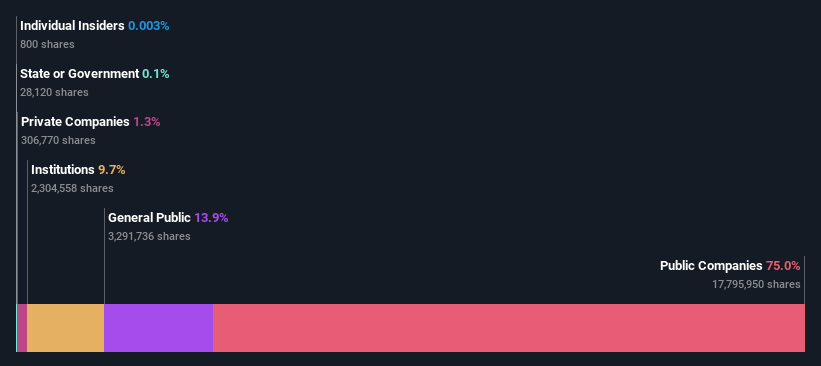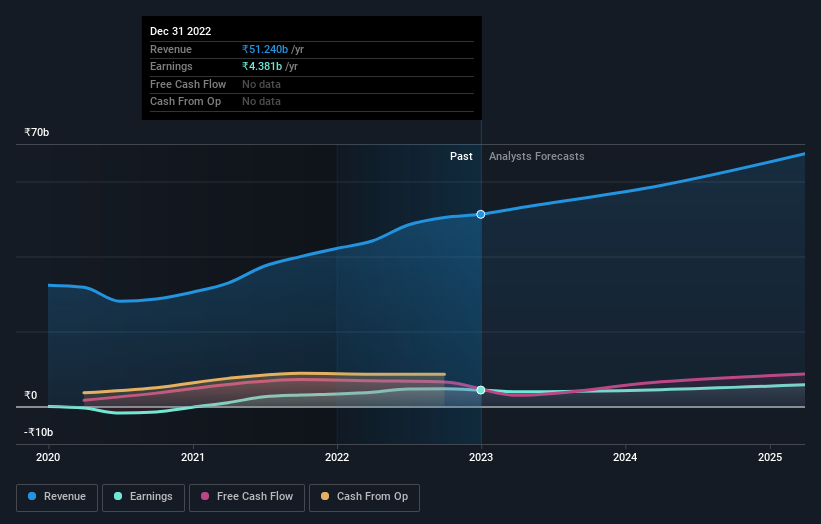Public companies are Blue Dart Express Limited's (NSE:BLUEDART) biggest owners and were hit after market cap dropped ₹7.7b

A look at the shareholders of Blue Dart Express Limited (NSE:BLUEDART) can tell us which group is most powerful. And the group that holds the biggest piece of the pie are public companies with 75% ownership. In other words, the group stands to gain the most (or lose the most) from their investment into the company.
And following last week's 5.0% decline in share price, public companies suffered the most losses.
In the chart below, we zoom in on the different ownership groups of Blue Dart Express.
See our latest analysis for Blue Dart Express

What Does The Institutional Ownership Tell Us About Blue Dart Express?
Many institutions measure their performance against an index that approximates the local market. So they usually pay more attention to companies that are included in major indices.
We can see that Blue Dart Express does have institutional investors; and they hold a good portion of the company's stock. This suggests some credibility amongst professional investors. But we can't rely on that fact alone since institutions make bad investments sometimes, just like everyone does. It is not uncommon to see a big share price drop if two large institutional investors try to sell out of a stock at the same time. So it is worth checking the past earnings trajectory of Blue Dart Express, (below). Of course, keep in mind that there are other factors to consider, too.

Hedge funds don't have many shares in Blue Dart Express. Looking at our data, we can see that the largest shareholder is Deutsche Post AG with 75% of shares outstanding. With such a huge stake in the ownership, we infer that they have significant control of the future of the company. ICICI Prudential Asset Management Company Limited is the second largest shareholder owning 2.7% of common stock, and Kotak Mahindra Asset Management Company Limited holds about 1.3% of the company stock.
While it makes sense to study institutional ownership data for a company, it also makes sense to study analyst sentiments to know which way the wind is blowing. Quite a few analysts cover the stock, so you could look into forecast growth quite easily.
Insider Ownership Of Blue Dart Express
The definition of company insiders can be subjective and does vary between jurisdictions. Our data reflects individual insiders, capturing board members at the very least. The company management answer to the board and the latter should represent the interests of shareholders. Notably, sometimes top-level managers are on the board themselves.
I generally consider insider ownership to be a good thing. However, on some occasions it makes it more difficult for other shareholders to hold the board accountable for decisions.
Our data suggests that insiders own under 1% of Blue Dart Express Limited in their own names. However, it's possible that insiders might have an indirect interest through a more complex structure. Keep in mind that it's a big company, and the insiders own ₹5.0m worth of shares. The absolute value might be more important than the proportional share. It is good to see board members owning shares, but it might be worth checking if those insiders have been buying.
General Public Ownership
With a 14% ownership, the general public, mostly comprising of individual investors, have some degree of sway over Blue Dart Express. While this group can't necessarily call the shots, it can certainly have a real influence on how the company is run.
Public Company Ownership
It appears to us that public companies own 75% of Blue Dart Express. This may be a strategic interest and the two companies may have related business interests. It could be that they have de-merged. This holding is probably worth investigating further.
Next Steps:
I find it very interesting to look at who exactly owns a company. But to truly gain insight, we need to consider other information, too. Consider for instance, the ever-present spectre of investment risk. We've identified 2 warning signs with Blue Dart Express , and understanding them should be part of your investment process.
Ultimately the future is most important. You can access this free report on analyst forecasts for the company.
NB: Figures in this article are calculated using data from the last twelve months, which refer to the 12-month period ending on the last date of the month the financial statement is dated. This may not be consistent with full year annual report figures.
Valuation is complex, but we're here to simplify it.
Discover if Blue Dart Express might be undervalued or overvalued with our detailed analysis, featuring fair value estimates, potential risks, dividends, insider trades, and its financial condition.
Access Free AnalysisHave feedback on this article? Concerned about the content? Get in touch with us directly. Alternatively, email editorial-team (at) simplywallst.com.
This article by Simply Wall St is general in nature. We provide commentary based on historical data and analyst forecasts only using an unbiased methodology and our articles are not intended to be financial advice. It does not constitute a recommendation to buy or sell any stock, and does not take account of your objectives, or your financial situation. We aim to bring you long-term focused analysis driven by fundamental data. Note that our analysis may not factor in the latest price-sensitive company announcements or qualitative material. Simply Wall St has no position in any stocks mentioned.
About NSEI:BLUEDART
High growth potential with adequate balance sheet.
Similar Companies
Market Insights
Community Narratives



